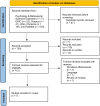Effectiveness of digital mental health interventions for university students: an umbrella review
- PMID: 35382010
- PMCID: PMC8977068
- DOI: 10.7717/peerj.13111
Effectiveness of digital mental health interventions for university students: an umbrella review
Abstract
Background: Poor mental health among university students remains a pressing public health issue. Over the past few years, digital health interventions have been developed and considered promising in increasing psychological wellbeing among university students. Therefore, this umbrella review aims to synthesize evidence on digital health interventions targeting university students and to evaluate their effectiveness.
Methods: A systematic literature search was performed in April 2021 searching PubMed, Psychology and Behavioural Science Collection, Web of Science, ERIC, and Scopus for systematic reviews and meta-analyses on digital mental health interventions targeting university students. The review protocol was registered in the International Prospective Register of Systematic Reviews PROSPERO [CRD42021234773].
Results: The initital literature search resulted in 806 records of which seven remained after duplicates were removed and evaluated against the inclusion criteria. Effectiveness was reported and categorized into the following six delivery types: (a) web-based, online/computer-delivered interventions (b) computer-based Cognitive Behavior Therapy (CBT), (c) mobile applications and short message service (d) virtual reality interventions (e) skills training (f) relaxation and exposure-based therapy. Results indicated web-based online/computer delivered-interventions were effective or at least partially effective at decressing depression, anxiety, stress and eating disorder symptoms. This was similar for skills-training interventions, CBT-based intervention and mobile applications. However, digital mental health interventions using virtual reality and relaxation, exposure-based therapy was inconclusive. Due to the variation in study settings and inconsistencies in reporting, effectiveness was greatly dependent on the delivery format, targeted mental health problem and targeted purpose group.
Conclusion: The findings provide evidence for the beneficial effect of digital mental health interventions for university students. However, this review calls for a more systematic approach in testing and reporting the effectiveness of digital mental health interventions.
Keywords: Digital health; Digital intervention; Mental health; Undergraduate; University students; Young people; mHealth.
© 2022 Harith et al.
Conflict of interest statement
The authors declare that they have no competing interests.
Similar articles
-
Digital Mental Health Interventions for Depression, Anxiety, and Enhancement of Psychological Well-Being Among College Students: Systematic Review.J Med Internet Res. 2019 Jul 22;21(7):e12869. doi: 10.2196/12869. J Med Internet Res. 2019. PMID: 31333198 Free PMC article.
-
Behavioural modification interventions for medically unexplained symptoms in primary care: systematic reviews and economic evaluation.Health Technol Assess. 2020 Sep;24(46):1-490. doi: 10.3310/hta24460. Health Technol Assess. 2020. PMID: 32975190 Free PMC article.
-
Supporting mental health and wellbeing of university and college students: A systematic review of review-level evidence of interventions.PLoS One. 2022 Jul 29;17(7):e0266725. doi: 10.1371/journal.pone.0266725. eCollection 2022. PLoS One. 2022. PMID: 35905058 Free PMC article.
-
Effects of Mobile Mindfulness Meditation on the Mental Health of University Students: Systematic Review and Meta-analysis.J Med Internet Res. 2023 Jan 3;25:e39128. doi: 10.2196/39128. J Med Internet Res. 2023. PMID: 36596239 Free PMC article.
-
Recovery schools for improving behavioral and academic outcomes among students in recovery from substance use disorders: a systematic review.Campbell Syst Rev. 2018 Oct 4;14(1):1-86. doi: 10.4073/csr.2018.9. eCollection 2018. Campbell Syst Rev. 2018. PMID: 37131375 Free PMC article.
Cited by
-
Mental health, study skills, social support, and barriers to seeking psychological help among university students: a call for mental health support in higher education.Front Public Health. 2023 Oct 18;11:1220614. doi: 10.3389/fpubh.2023.1220614. eCollection 2023. Front Public Health. 2023. PMID: 37920583 Free PMC article.
-
Prevalence and correlates of subjective cognitive concerns in Australian university students during the COVID-19 pandemic.Front Psychol. 2023 Jan 11;13:1094497. doi: 10.3389/fpsyg.2022.1094497. eCollection 2022. Front Psychol. 2023. PMID: 36710843 Free PMC article.
-
Potential and Pitfalls of Mobile Mental Health Apps in Traditional Treatment: An Umbrella Review.J Pers Med. 2022 Aug 25;12(9):1376. doi: 10.3390/jpm12091376. J Pers Med. 2022. PMID: 36143161 Free PMC article. Review.
-
Health-related behavioral changes during the COVID-19 pandemic. A comparison between cohorts of French and Italian university students.PLOS Glob Public Health. 2023 Sep 8;3(9):e0002298. doi: 10.1371/journal.pgph.0002298. eCollection 2023. PLOS Glob Public Health. 2023. PMID: 37682794 Free PMC article.
-
University Students' Financial Situation During COVID-19 and Anxiety and Depressive Symptoms: Results of the COVID-19 German Student Well-Being Study (C19 GSWS).Psychol Res Behav Manag. 2024 Jun 4;17:2271-2285. doi: 10.2147/PRBM.S453694. eCollection 2024. Psychol Res Behav Manag. 2024. PMID: 38860194 Free PMC article.
References
-
- American College Health Association . American College Health Association-National College Health Assessment II: Fall 2017 reference group executive summary. Silver Spring: American College Health Association; 2017.
-
- Aromataris E, Fernandez R, Godfrey C, Holly C, Khalil H, Tungpunkom P. Chapter 10: umbrella reviews. In: Aromataris E, Munn Z, editors. JBI Manual for Evidence Synthesis. JBI. 2020.
-
- Auerbach RP, Mortier P, Bruffaerts R, Alonso J, Benjet C, Cuijpers P, Demyttenaere K, Ebert DD, Green JG, Hasking P, Murray E, Nock MK, Pinder-Amaker S, Sampson NA, Stein DJ, Vilagut G, Zaslavsky AM, Kessler RC, WHO WMH-ICS Collaborators WHO world mental health surveys international college student project: prevalence and distribution of mental disorders. Journal of Abnormal Psychology. 2018;127(7):623–638. doi: 10.1037/abn0000362. - DOI - PMC - PubMed
Publication types
MeSH terms
LinkOut - more resources
Full Text Sources
Medical
Miscellaneous


